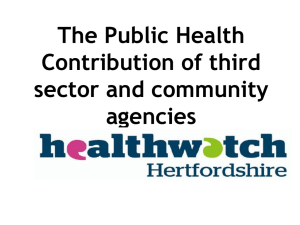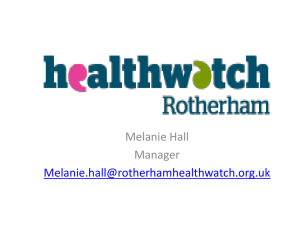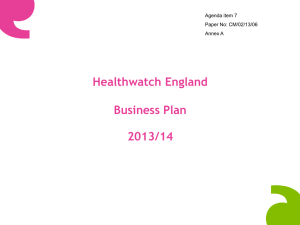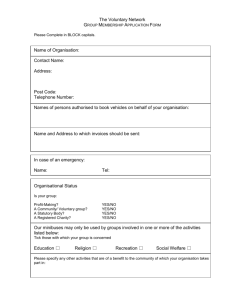Local HealthWatch Update
advertisement
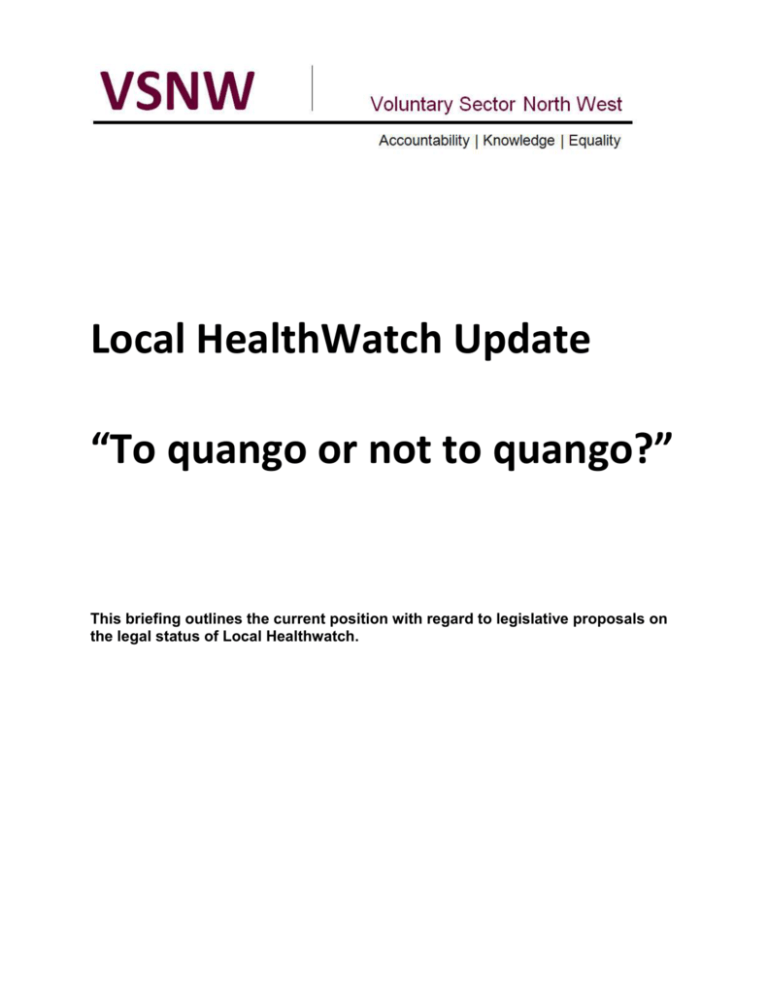
Local HealthWatch Update “To quango or not to quango?” This briefing outlines the current position with regard to legislative proposals on the legal status of Local Healthwatch. As outlined in Briefing #70 Local Involvement Networks do not exist as a legal entity but are a membership network with legal functions. They have carried out their functions with the support of a host organisation. They were set up under the Local Authority and Public Involvement in Health Act 2007. The vision for the new Local Healthwatch organisation is that they will be the independent voice of patients and the public in local areas. One of the important new areas where Healthwatch will have a role is through its statutory place on the new Health and Wellbeing Boards. Local HealthWatch will be a ‘body corporate’ which means it will be an organisation with its own legal structure, governance, able to employ people, contract for services and hold property. Upper tier local authorities have the responsibility to set up Local HealthWatch. Under the current proposals before Parliament, Local HealthWatch would be a ‘statutory’ organisation which will carry out the current legal functions of LINks along with new additional roles. However, it has now become clear that local authorities are not empowered to set up a statutory organisation (in essence a quango). If Local HealthWatch is to be a statutory organisation then it would have to be set up by central government. As the current government has ‘localism’ as a key driver for all its policies it could appear to be a backward step if it chose to set up 150 local quangos as statutory Healthwatch organisations. The Health and Social Care Bill is now at the report stage in the House of Lords. There is a debate taking place amongst the different groups with an interest in the development of local Healthwatch, including the lobbying of ministers. In particular, the National Association for LINk Members (NALM) feels that if local Healthwatch is not a statutory organisation it will not have the same level of influence or power and may be in danger of being ignored. On the other hand NAVCA has issued a six point test in which it says that it wants local Healthwatch to be non-statutory organisations with statutory functions and the legislation to “enable the creation of powerful, grassroots organisations accountable first and foremost to local communities”. Whatever happens, either statutory or non-statutory organisation, local HealthWatch organisations will be legal entities and so the relationship that LINks have with host organisations will come to an end in their current form on 31st March 2013. The final decision will be reflected in amendments to the Local Authority and Public Involvement in Health Bill and the Health and Social Care Bill. It is understood that this process will be complete by 6th March 2012. VSNW View As an organisation which believes in a strong and accountable local voluntary and community sector, VSNW agrees that a non-statutory organisation with statutory powers would be the right way forward. VSNW feels it is essential that both the LINks and the wider voluntary and community sector is involved with the local authority in the development of a Local Healthwatch organisation which is truly accountable to the local community. The local voluntary sector infrastructure has a wealth of experience in setting up local organisations and this is an opportunity for the local authority to draw on this as part of the development process. Although, there could be an argument for a statutory organisation as it could be seen as having more power and influence because it was an arm’s length government body. However, it could be said that its accountability to the local community would not be as strong because the secretary of state would regulate its board membership. Whereas a non-statutory organisation would be able to have its own democratic processes for governance selection. The other significant issue to be mindful of in this debate is the role of Local HealthWatch on Health and Wellbeing Boards. For most local authority areas in the North West, Local Healthwatch will be representing not just the public but also the wider voluntary and community sector. Currently only nine out of the twenty-three Health & Wellbeing Boards also offer a place to the voluntary and community sector as well as Local HealthWatch. Therefore, Local Healthwatch has an important role to play in bringing the voice and evidence of local voluntary organisations to influence the shape of the Joint Strategic Needs Assessment and the Health and Wellbeing Strategy. If Local Healthwatch was a statutory organisation, would local voluntary sector organisations feel they would be able to bring the voluntary and community sector perspective to discussions? VSNW feels very strongly that Local Healthwatch should not be expected to represent the views of the public as well as the local voluntary and community sector on Health and Wellbeing Boards. There should be a place for the representative voice of the voluntary and community sector as well. This can most easily be done through either the local infrastructure organisation or voluntary sector forum. The argument that the voluntary sector cannot be there because it is a provider would not seem to be valid when Clinical Commissioning Groups will be represented. Local Healthwatch is also increasingly being seen as the place where the ‘hardwiring of public engagement with Health and Wellbeing Boards’ will take place. Would local communities feel that a statutory organisation would carry this out as well as a local organisation set up and developed in partnership with the local authority, LINks and the wider local VCS? The transition from LINks to HealthWatch is being led by a designated HealthWatch Lead in each upper tier local authority area. Almost all now have set up transition groups which includes the LINk chair, often the current host organisation, and other stakeholder partners. If you wish to know what progress is being made in the transition from LINks to HealthWatch then contact your local LINk. If you wish to lobby for Local HealthWatch to be a non-statutory organisation then contact your local MP. The Health and Social Care Bill returns to the Lords on 27 th February 2012. Go to the UK Parliament website for more information. Martin Morton Policy & Network Officer Support (Health & Social Care) health@vsnw.org.uk 0161 276 9300 VSNW (Voluntary Sector North West) is the regional voluntary sector network for the North West. The purpose of VSNW is to ensure that the voluntary and community sector (VCS), in all its diversity, takes its full part in shaping the future of the North West. VSNW works with 150 members which work across the region directly supporting and delivering services for individuals, or are VCS infrastructure organisations (LIOs) that work with local voluntary and community groups. VSNW members provide community services, regenerate neighbourhoods, support individuals, promote volunteering and tackle discrimination. The 40 generalist LIOs in membership of VSNW have a membership of 6,780 VCS groups and are in contact with 19,800 local voluntary and community sector groups in the North West – just under twothirds (63%) of the region’s VCS groups. Voluntary Sector North West (VSNW) St Thomas Centre Ardwick Green North Manchester M12 6FZ Tel: 0161 276 9300 Fax: 0161 276 9301 Email: policy@vsnw.org.uk Web: www.vsnw.org.uk Registered charity no. 1081654 Company limited by guarantee Registered in England no. 3988903 Registered office as above VSNW’s briefing service is funded by The Big Lottery Fund
